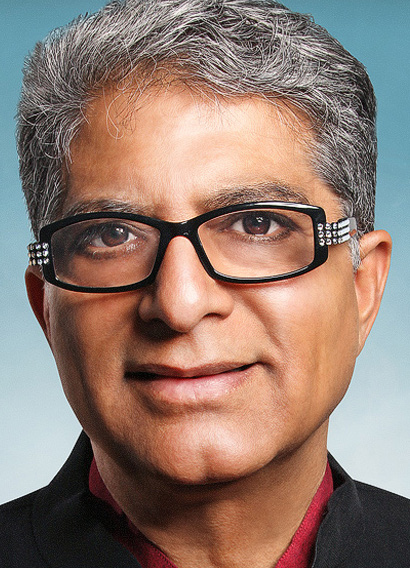Deepak Chopra, pioneer of mind and body medicine, and US nutritionist Kimberly Snyder explain how the six pillars of healthy living have the power to balance, heal and transform.
Deepak Chopra is the author of more than 80 books, which have been translated in over 43 languages, including 22 New York Times bestsellers. As well as being trained in internal medicine and endocrinology, Deepak is a Fellow of the American College of Physicians, and a member of the American Association of Clinical Endocrinologists. It’s fair to say he knows a thing or two about the human body.
Deepak’s latest book, Radiant Beauty, sees him team up with renowned celebrity nutritionist Kimberly Snyder to enlighten us all on the six pillars of healthy living. Those are: internal and external nourishment, beauty sleep, primal beauty, movement and spiritual beauty. By focusing on these, Deepak and Kimberly offer an exciting and practical guide to help you transform yourself from the inside out. And the best bit? It’s all achieved through simple and easy-to-follow lifestyle tweaks.
Radiant Beauty explains everything from why certain foods help achieve greater health and beauty – such as what to eat for optimised digestion – to which massage oils can soothe the nervous system and reduce stress. This is a book to live by – but it’s not only about what you eat, drink or rub on your body – it’s also about the when and the how.
Establishing a routine is key, according to Snyder. “While your overall daily routine is important to promote Peak Beauty Sleep, the most important piece of the routine takes place in the evening before bed. it is so important to help you achieve Radical Beauty.”
Snyder goes on to explain: “Followed daily, a regular evening routine will help you prepare mentally and physically for sleep by giving cues to your internal clock. This will help you get the best possible beauty sleep every day and in the long-term, which is where the real benefits are to be had. What you choose to do for your evening routine is completely up to you. Every person will respond differently to each activity.
“You can choose one of these suggestions, a combination of them, or come up with your own ideas for how to wind down in the evening before bed. The most important thing is that you pick something that makes you feel relaxed and that you do it at the same time every day as often as you can.”
Here are some suggestions for your evening routine.
SIP SOMETHING SOOTHING
After dinner, sip some herbal tea or hot almond or hemp milk while relaxing or getting ready for bed.
GET DIM
After 6pm in the winter or 7pm in the summer, start dimming the lights in your home. Try using candles at dinner and in whatever room of the house you are in to start reducing your exposure to artificial lights. You don’t have to go full precolonial style, but any time you can reduce artificial lighting, the better.
PRACTICE ABHYANGA
If you are too rushed in the mornings, you can perform your abhyanga routine in the evening. Or practice a shorter variation of abhyanga foll- owed by a relaxing hot bath or shower. If you completed your abhyanga in the morning, a nice warm bath or shower might be relaxing by itself.
RELAX TO MUSIC
Try a routine of listening to some music you find truly relaxing. Music can help to powerfully relax your mind. Find some music you connect to with a slower vibration that leaves you feeling soothed and chilled out. No stimulating hip-hop or hard rock at this time!
HONOUR THE SACRED HOUR
Treat the last hour before bed as sacred time for you. Try reading something relaxing or spiritually uplifting, or meditating. There are excellent ways to set the energetic tone as you drift into sleep. Your nighttime reading should be done with real books instead of an electronic reader that can disrupt your internal cues and sleep patterns.
During the sacred hour, what you avoid is just as crucial as what you engage in. Avoid stressful or stimulating activities. Late at night is not the ideal time to complete last-minute work on a presentation, hit the gym, or engage in a dynamic Vinyasa yoga flow. It’s also not the best time to get into a big emotional discussion with your partner or a friend. You’ll be better off saving that for morning tea or a Saturday hike, if you can put it off until then. Stressful activities just have no place before bedtime. They can induce your body to secrete the stress hormone cortisol, which can make you feel more alert. Chill out and steer clear of anything non–chilled out.
SECURE THE BEST BEAUTY SLEEP POSE
Research has shown that exactly how you sleep on your pillow can influence wrinkle formation. One study from the journal of Clinical and Experimental Dermatology studied mechanical forces on the face and how they influenced wrinkles and superficial facial changes, including the formation of crow’s-feet and lines around the mouth. They found that redistributing pressure could help reduce wrinkles.
So what can you do? First, ensure that you have the right kind of pillow and avoid sleeping on your stomach, which may create pressure and enhance wrinkles to an even greater degree. Also avoid crossing your legs when you sleep. It’s not only bad for circulation, but can also twist your spine, leaving you feeling unbalanced in the morning. Try sleeping with a pillow between your legs, which will keep your legs and hips more balanced.




